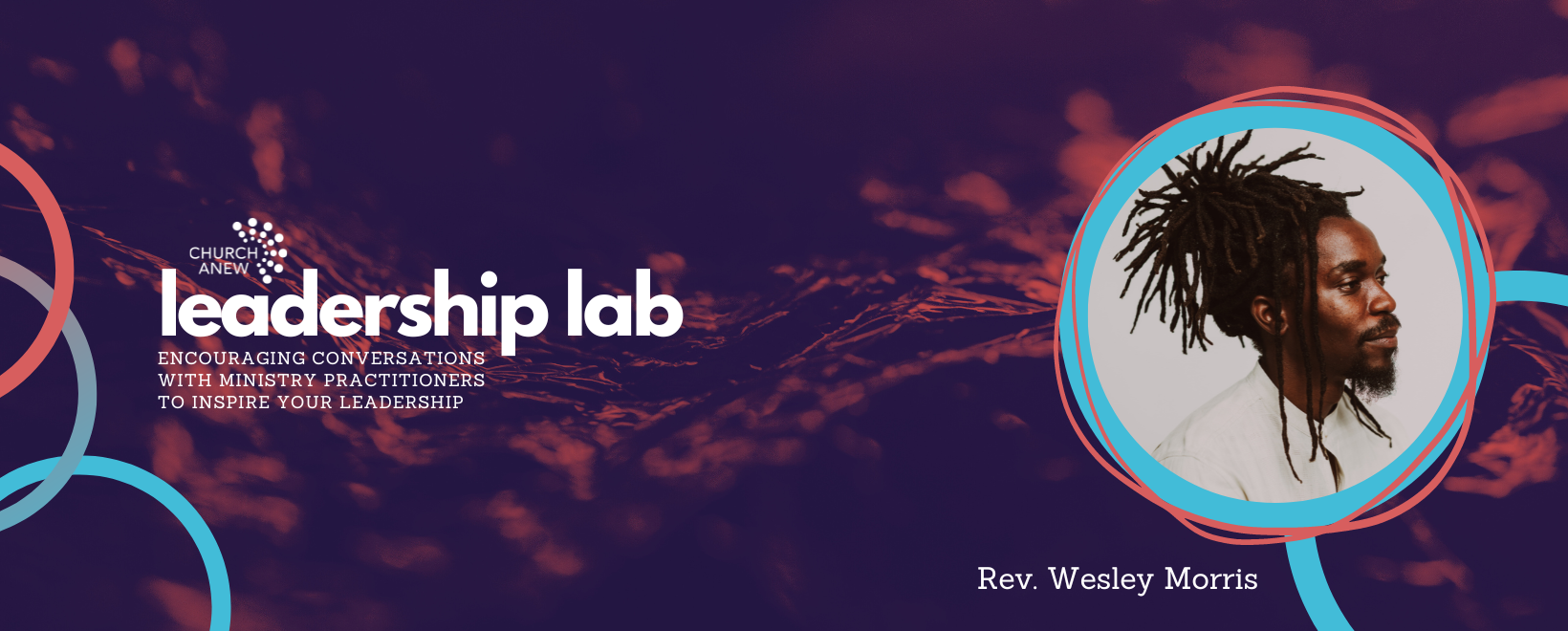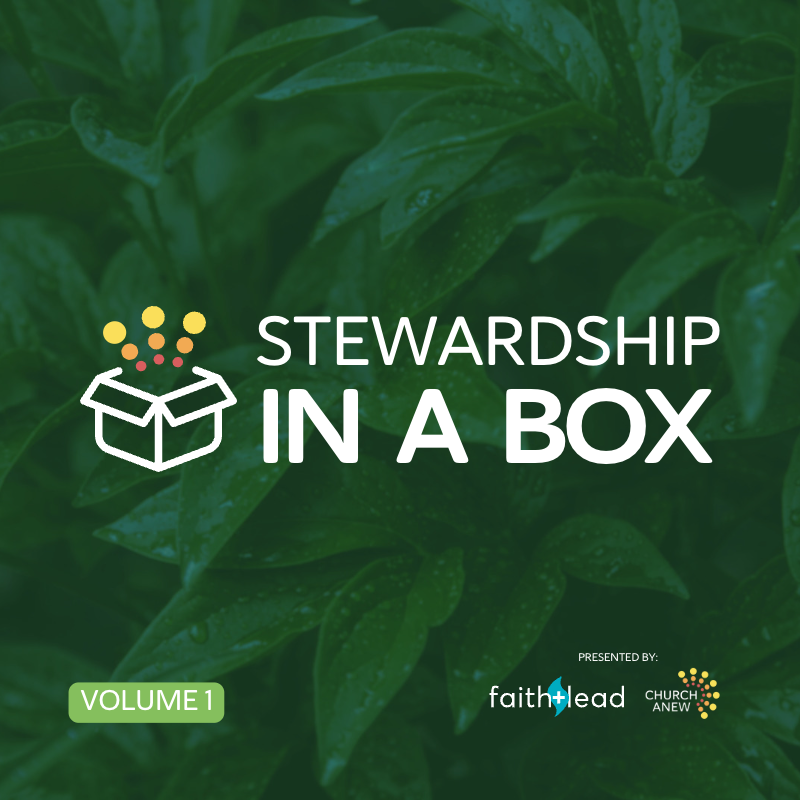Leadership Lab: Wesley Morris
Over the past year the Church Anew team has been working to connect and build resources for church leaders to see what their colleagues are doing around the country. With that the Leadership Lab was born. We have interviewed several church leaders doing innovative and amazing things, and we want to share their knowledge and wisdom with the world.
Our first interview is with Wesley Morris, who was involved in our Enfleshing Witness project. He has roots in community organizing, and is currently serving as pastor of Faith Community Church in Greensboro, North Carolina. We were honored to have a Zoom conversation chock full of wisdom we wanted to share.
Church Anew: What is your ministry context?
Wesley Morris: I am the senior pastor of Faith Community Church. The second pastor of this church, the founding pastor, and pastoral team emeritus are my elders, my mentors. I still see them, and they are members of the church. I came to this work of pastor through being a youth pastor and a child of the church, and also being someone who effectively became disenchanted with the church for a while. Then I had a journey of self reclamation, raising my awareness of who I was, and who I was becoming. And so a lot of that was exploration into religious engagement, and understanding that when I came back to the church it was really under the salvific scripture of Matthew 11:28. “Come on to me, all you who are heavy laden and burdened down with care. and I will give you rest”. So that is part of my scope of ministry. There are folks who live in the continual need of rest. These are some inner needs that I think about when I think about our ministry. Our ministry is geared towards children, number one. Creating and having a sustainable viable environment where children get to be children. and don’t have to rush into adulthood.
Another aspect of our church is geared towards a justice ministry, a ministry of fairness, a ministry of looking that is not abstract, but practical. Attending our city council meetings, and protests [if need be], and calling in when you have the opportunity to speak out, and proclaiming liberty for those who have been bruised. That's the Lukean [Luke is often viewed as the social justice gospel] approach to Jesus’s ministry that we take in here. It's generational in nature, but also by circumstance because we are an older congregation. The Beloved Community Center is in our church, as well. It is a nonprofit that we have a very close relationship with. Sometimes people even say, Beloved Community Church, even though we are the Faith Community Church. Beloved is anchored in the truth and reconciliation work of the city of Greensboro and so is our ministry.
CA: What have been some challenges in your ministry area?
WM: The model of churches and of being a senior pastor. I was in seminary learning, and I thought a lot about Christian education and how I would deploy what I learned. But then it came to a point where I realized there are 52 weeks in the year, and that's 52 sermons. If you're one pastor, and then there's Bible study, and there's pastoral care. A lot of my peers, myself included, have to be bi-vocational.
There's a strong cultural impact of emerging as a church anew within a church that has a very strong, a very powerful ministry and history, and so I think I would name the challenges as the stretching, the tugs, and the pulls that happen in the pastoral position. The setup of a church, and the many roles of a pastor, are struggles that I still deal with.
CA: When did the Matthew passage really become part of your call and your ministry?
WM: Before I joined the Church in 2008, I had left and gone with other spiritual and faith communities. Those spaces I still highly honor, and they became integrated into what I do now. I was physically worn out. Looking at my life, I was zipping around traveling, organizing. I was intimate with burn out. That was an invitation from Jesus to let me speak with you and sit with you and talk with you. I often relate to the the man who was possessed. He was chained outside the the city limits by the tombs. The conclusion of that story was that Jesus related to him and just sat with him, and then they said he came to himself. Basically just sitting down and talking and acknowledging who he was, he was released from some of that burden.
I found myself needing rest for my body and rest for my soul, because while I was greatly impacted positively by my time with other spiritual traditions, it felt like I was kind of on a road trip. It didn't feel home. Coming back to that Scripture was where I found a renewed sense of self, and that helped me to start seeing my mentors living the Word of God differently. They told me, “We're gonna be rewiring how you understand some of the things that you hear and the things that you see, and that rewiring really was this re-description of love. In practice, what does love do in a housing struggle? What does love do in the middle of a tobacco field? When there are folks coming together? When people’s human rights are being abused? What does love do in the middle of street conflict?” Those are literal examples that I actually have by way of being with this community.
CA: Can you share some of the wisdom that you learned from your time at Union Theological Seminary either from mentors or your own spiritual journey?
WM: I went wanting to step back and to be more invested in the reading and research aspects of seminary, which was totally blown up in my first month because of the killings all throughout the country. My first month was 2014, and Michael Brown was killed by the police in Ferguson, and then Eric Garner was killed in New York, and that's where our school is. My first semester, they interrupted our studies, and we went out to Ferguson, Missouri by bus to bear witness and to answer a national call to join them. During this time, I'm studying with Dr. James Cone as my advisor, and he's teaching black liberation theology in this context. It was the election of Donald Trump, and the embattling of Republicans and Democrats, and all that. So my seminary experience was bookended by a city in total uproar, and a nation and a country pretty much full of conflict. Sandwiched there, I'm reading Bonhoeffer and the traditional seminary text and getting real-time application. That's one thing I took from this super-concentrated experience. It was a super experience, for folks who care about social justice for sure, but I learned there are so many nuanced ways of approaching liberation. That to be able to learn what liberation looks like in this part of the country, and to listen to classmates who came for that call was eye-opening. What I realized is that it's not the place. It's actually the people that venture there, and the spirit that they believe is there.
CA: How has your other vocation of community organizing informed your ministry?
WM: There's a phrase that I got when I was younger, that everything is one thing. When I'm doing a diversity of projects, or wrangling a multiplicity of ideas, I can settle back and say this is about community, or this is about building relationships. That's the one thing. It's about building relationships, quality relationships. So when I was a community organizer, it was on the front of homeless hospitality. It was on the front of economic justice and housing justice and peace treaty work, but in all of that we're just building community. I'm not shrugging it off, but it helped me to dial back, to focus.
CA: What advice do you have for pastors and ministers who are trying to broaden their outreach with congregations who may be more insular?
WM: I love this question because I always say the same thing. Go to the library, and look at the bulletin board, and see what people have questions about. Ask librarians what's their sense of the community? What's their sense of what's been going on or what's happening? The other thing is, I'm a child of working in community centers. The person that runs the community center, that's another person. Go talk to them. If you can just spend 30 min with them and talk about what's their sense of the neighborhood? Also watch the local news or the public access channel. Those are the things that have helped me when I go to other places and want to be respectful. The last two are things are something I just do. I don't necessarily recommend them. Whatever you like to do, whatever you want to do, it's happening somewhere in the place, and it's probably not too far away from you. And so when we're in meetings we can talk about these things and understand where everyone is coming from.
CA: What words of encouragement or challenge do you want to share with other church leaders?
WM: Do the best you can. Others have experienced what you're experiencing right now, so you’re not alone. Try to read. I read Howard Thurman and Renita Wes. They were writers out of the pastoral tradition that I think squeeze a lot out of it. It's like, you know, you squeeze an orange and a lot of juice comes out, but if you squeeze a little bit more, a little bit more will come out. I think they do the extra squeezing on the pastoral experience because I'm trying to be as gentle and nice as I can on understanding that part. Also, remember that it's okay to stop, and not do something. That it's okay to change your course. All those things, I think, should be said much, much more. Failure isn't what you think it is, you know. Don't think of yourself as a failure.
Special thanks to Elizabeth Schoen, one of our Church Anew interns over the summer, for her work to get the Leadership Lab series launched!
Wesley Morris
Wesley Morris is the Senior Pastor of Faith Community Church in Greensboro, NC. Also, he is a dedicated coach, facilitator, community organizer, chaplain and internationally recognized leader who uses his dynamic speaking talents to inspire all who have the opportunity to hear his voice.
Church Anew is dedicated to igniting faithful imagination and sustaining inspired innovation by offering transformative learning opportunities for church leaders and faithful people.
As an ecumenical and inclusive ministry of St. Andrew Lutheran Church, the content of each Church Anew blog represents the voice of the individual writer and does not necessarily reflect the position of Church Anew or St. Andrew Lutheran Church on any specific topic.



